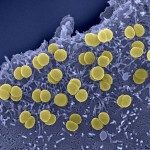Link to Pubmed [PMID] – 30592763
PLoS ONE 2018;13(12):e0209919
Herd protection, resulting from the interruption of transmission and asymptomatic carriage, is an important element of the effectiveness of vaccines against the meningococcus. Whilst this has been well established for conjugate polysaccharide vaccines directed against the meningococcal capsule, two uncertainties surround the potential herd protection provided by the novel protein-based vaccines that are used in place of serogroup B (MenB) polysaccharide vaccines (i) the strain coverage of such vaccines against carried meningococci, which are highly diverse; and (ii) the generation of a protective immune response in the mucosa. These considerations are essential for realistic estimates of cost-effectiveness of new MenB vaccines. Here the first of these questions is addressed by the whole genome sequence (WGS) analysis of meningococci isolated from healthy military recruits and university students in Greece. The study included a total of 71 MenB isolates obtained from 1420 oropharyngeal single swab samples collected from military recruits and university students on voluntary basis, aged 18-26 years. In addition to WGS analysis to identify genetic lineage and vaccine antigen genes, including the Bexsero Antigen Sequence Type (BAST), the isolates were examined with the serological Meningococcal antigen Typing System (MATS) assay. Comparison of these data demonstrated that the carried meningococcal population was highly diverse with 38% of the carriage isolates showed expression of antigens matching those included in the 4CMenB vaccine. Our data may suggest a limited potential herd immunity to be expected and be driven by an impact on a subset of carriage isolates.

